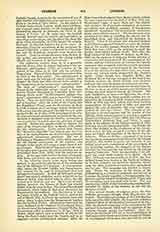

Low Sunday, the first Sunday after Easter. The origin of the name is uncertain, but it is apparently intended to indicate the contrast between it and the great Easter festival immediately preceding, and also perhaps, to signify that, being the Octave Day o Easter, it was considered part of that feast, though in a lower degree. Its liturgical name is Dominica in albis depositis, derived from the fact that on it the neophytes, who had been baptized on Easter Eve, then for the first time laid aside their white baptismal robes. St. Augustine mentions this custom in a sermon for the day, and it is also alluded to in the Eastertide Vesper hymn, “Ad regias Agni dapes” (or, in its older form, “Ad ceenam Agni providi”), written by an ancient imitator of St. Ambrose. Low Sunday is also called by some liturgical writers Pascha clausum, signifying the close of the Easter Octave, and “Quasimodo Sunday“, from the Introit at Mass—”Quasi mode geniti infantes, rationabile, sine dole lac concupiscite”,—which words are used by the Church with special reference to the newly baptized neophytes, as well as in general allusion to man’s renovation through the Resurrection. The latter name is still common in parts of France and Germany.
G. CYPRIAN ALSTON

